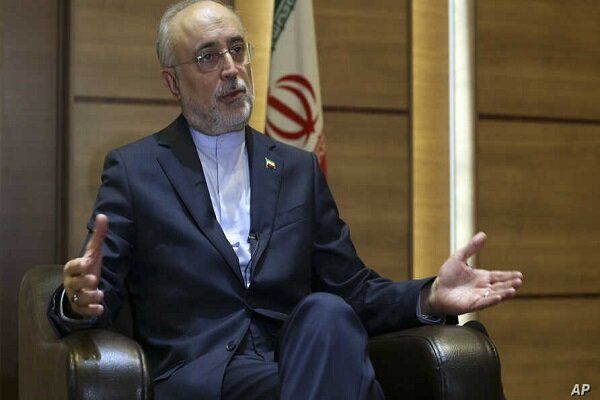Head of the Atomic Energy Organization of Iran (AEOI) Ali Akbar Salehi who delivered a speech virtually at the 64th International Atomic Energy Agency (IAEA) General Conference, voiced Iran's readiness to cooperate with the international community to return diplomacy and multilateralism to the center of international relations.
"It is no secret that international organizations are under political pressure from some countries, and the IAEA is no exception. On the one hand, at this critical juncture for multilateralism, the reason for the existence of the United Nations system has been seriously questioned, and on the other hand, the International Atomic Energy Agency has faced very serious challenges of its kind since its inception," Salehi said.
Salehi, however, appreciated the international community's opposition to the US proposal to extend arms embargo on Iran and rejection of US claim to use the snapback mechanism, saying, "Members of the UN Security Council in New York have rightly indicated that they are unwilling to compromise on these achievements because of the intimidation of a particular member state."
"13 of the 15 members of the Security Council not only unanimously rejected the US resolution on the extension of the arms embargo against Iran, which was in clear violation of UNSCR 2231, but also they refused to recognize the United States as a participant of JCPOA to use special mechanisms of this agreement to return the ended Security Council sanctions," he added.
"This is a real achievement that must be safeguarded," Salehi stressed.
Elsewhere in his remarks, Salehi said, “The Agency must demonstrate its commitment, impartiality, independence and professionalism within the framework of the safeguards obligations of States under the Comprehensive Safeguards Agreement and the Additional Protocol.”
Referring to the status of JCPOA, he said, “While there is still a common consensus among the international community that the JCPOA should be maintained as a real turning point in the history of multilateralism and as an important diplomatic achievement, this agreement is in a quasi-deadlocked situation due to the illegal withdrawal of the United States.”
Stating that maintaining JCPOA is the shared responsibility of all members of the international community, Salehi highlighted, “In this regard, the responsibility of the European Union, especially the three European countries as participants of the JCPOA, is of great importance, including the fact that they must fulfill their obligations fully and effectively."
"Therefore, this agreement will be maintained only when all participants involved in the JCPOA implement all provisions in a balanced way," he added, saying, " As a result, Iran has and had no other option rather adopt a step-by-step approach in implementing paragraphs 26 and 36 of the JCPOA to restore the lost balance to the Deal."
"Nuclear safety is among Iran’s highest priorities. In doing so, progress has been made in establishing an advanced Nuclear Safety Center (NSC). While the responsibility for nuclear safety and security rests entirely with the Member States, Iran strongly believes that these areas need to be strengthened and enhanced through cooperation between States," Salehi noted.
He continued, "New threats by malicious sides have been observed recently by way of cyber and other technological instruments. In this regard, let me point to the recent explosion at Shahid Ahmadi Roshan (Natanz) Nuclear Facility which was the result of sabotage as already declared. These malicious acts need to be condemned by the Agency and the Member States. Iran reserves its rights to protect its facilities and make necessary reactions to any threat as appropriate."
"Iran persists in its path towards the peaceful application of nuclear science and technology in various fields including agriculture, health, and industry while continuing to generate electricity," he said, adding, "Here, we reiterate that one of the main missions of the IAEA is “to foster the exchange of scientific and technical cooperation on the peaceful uses of atomic energy” and “to encourage the exchange and training of scientists and experts in the field of peaceful uses of atomic energy” among member states."
"One last word of wisdom, the professional, impartial, and independent nature of the work of the Agency would only be guaranteed if the Agency also considers unequivocally and impartially the available information on the nuclear activities of the Kingdom of Saudi Arabia," Salehi said.
He added, "If Saudi Arabia is seeking for a peaceful nuclear program, it should act in a very transparent manner and allow the Agency’s inspectors to verify its activities. In this context, the regime of Israel as a non-party to the NPT which has continually and adamantly refused to adhere to the IAEA safeguards requires an unbiased and professional approach by the Agency."
"This regime which is the main source of instability and insecurity in the region as well as a threat to international peace and security, should abandon its Weapons of Mass Destruction program and accede to the NPT without further delay and precondition. Needless to say that, clarifications on the nuclear activities and programs in this regard would certainly strengthen the credibility and professionalism of the Agency," he noted.
"Iran is ready to continue its efforts and cooperation with others in the International Community to bring back multilateralism and diplomacy at the center of international relations. To this end, there is no way but to get united and put an end to the destructive behavior of the current United States administration for the interests of all of us in the international community," he stressed.
The 64th Annual Regular Session of the IAEA General Conference (GC (64)) kicked off on Monday at the Vienna International Centre (VIC) in Vienna, Austria, where high-ranking officials and representatives from IAEA Member States are scheduled to discuss a range of issues.
ZZ/IRN84048764
